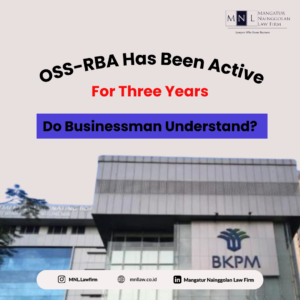
On August 9, 2021, President Jokowi launched the Risk-Based Business Licensing System, which is more commonly known as OSS-RBA. However, after three years of OSS-RBA implementation, it appears that many business actors still do not fully understand the differences in business licensing between OSS-RBA and the previously applicable OSS 1.1. The first thing that business actors must know is the type of business risk and the required licenses, namely:
- Low-risk business activities (R) only require a business license in the form of a Business Identification Number (NIB);
- Medium-low-risk business activities (MR) require a business license in the form of an NIB and a Standard Certificate (SS) in the form of a self-declaration;
- Medium-high-risk business activities (MT) require a business license in the form of an NIB and SS, which must be verified by the relevant Ministry/Agency/Local Government;
- High-risk business activities (T) require a business license in the form of an NIB and permits that must be approved by the relevant Ministry/Agency/Local Government and/or SS if required.
It should be noted that one NIB can apply to several KBLIs (Indonesian Standard Industrial Classification). Furthermore, to obtain business permits as mentioned above, businessman require a location permit now known as Activity Utilization Space Compliance (“KKPR”). However, for Micro and Small Enterprises (UMK), they only need to submit a self-declaration statement available in OSS-RBA stating that the business location complies with spatial planning and is willing to be subject to sanctions according to applicable regulations if any non-compliance is found in the future. However, for Non-UMK scale businesses, it is necessary to obtain KKPR, which can be done through OSS or the Ministry of ATR/BPN system.
There are two ways to obtain KKPR:
- KKKPR, which is a document stating the compliance between the spatial utilization activity plan and the Detailed Spatial Plan (RDTR);
- PKKPR, which is a document stating the compliance between the spatial utilization activity plan and the Spatial Plan (RTR) other than RDTR.
For businesses that have obtained the NIB and have valid location permits issued before the Job Creation Law (UU Cipta Kerja), those location permits can still be used. However, for renewal purposes, the location permit will be converted to KKPR. Furthermore, businesses no longer need to process the Trading Business License (“SIUP”) separately, as the SIUP is now integrated with the NIB. Therefore, once the NIB is issued, the SIUP is also considered issued.
If licensing data is still connected to the previous OSS version, it is mandatory for businesses to migrate the data to OSS-RBA. Businesses also need to check whether their KBLI (Indonesian Standard Industrial Classification) codes have changed from KBLI 2017 to KBLI 2020. However, it should be noted that not all business permits require data migration; for example, “Administrative Branch Office” permits do not need data migration as they do not involve business activities.
If you need legal consultation about any legal case, you can contact us through:
Email: secretary@mnllaw.co.id
Call: +62 21-3905928
